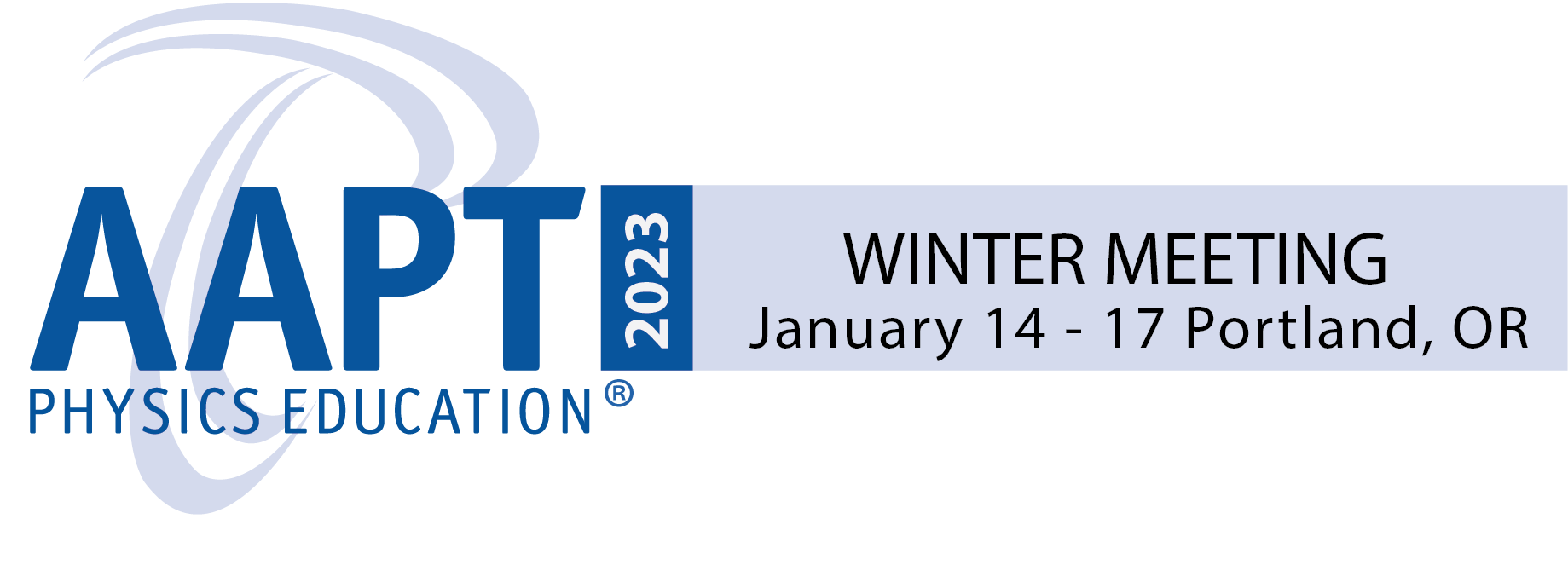 2023 AAPT WINTER MEETING
2023 AAPT WINTER MEETING
January 14–17, Portland, Oregon
Statistics
Attendees: 488
Exhibitors: 9
Sessions: 40
Workshops: 12
Commercial Workshops: 5
Tutorials: 0
Topical Discussion:2
Posters: 17 poster topics
Program Committee Chair: Kelli Warble
Special Thanks
AAPT wishes to thank the following for their dedication and selfless contributions to the Winter Meeting:
- Toby A. Dittrich, Portland Community College
- Christine and David Vernier
AAPT returned to beautiful downtown Portland, Oregon for the first Winter Meeting since the COVID Pandemic limited in person gatherings. The headquarters hotels for the 2023 Winter Meeting were the Hilton Portland Downtown and The Duniway Portland a Hilton hotel. Portland Community College and Vernier Science Education hosted workshops on Saturday and Sunday with selections ranging from “Fun, Engaging, Effective, Research-Validated Lab Activities and Demos for Introductory University, College and High School Physics (including Virtual Learning Options), Neutrino Physics Masterclasses” to “PICUP: Integrating Computation in Introductory Physics Courses.” Commercial Workshops were hosted by PASCO Scientific, Expert TA, Perimeter Institute, Pearson, and Vernier. Attendees also enjoyed a variety of social opportunities such as the Accessibility Meet-Up, Early Career & First Timers Gathering, Two Year College Gathering, First Timers' Gathering, Multi-Cultural Meet-Up, LGBTQ+ Meet-Up, SPS Awards and Trivia Dinner, and Game Night.
Tours and Special Events
Vernier Science Education Evening Event Attendees enjoyed an evening with David and Christine Vernier and the Vernier Science Education Team at their headquarters for dinner and beverages. Vernier \provided transportation for attendees, hosted tours (including a trip down memory lane in Dave's museum), and provided interactive displays.
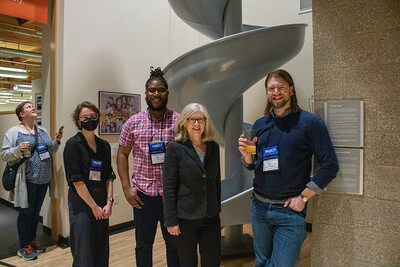
LIGO Hanford Observatory Tour During this tour participants had a chance to explore many interactive and static exhibits now housed in LHO's new LIGO Exploration Center (LExC). All of the artifacts that used to be in the lobby of LHO's small reception building are now housed in LExC, including the historic Weber Bar (one of the earliest devices designed to detect gravitational waves) and a full-scale They visited the one point on the site where they coluld see both of the interferometer's 4km-long arms reaching into the Eastern Washington shrub steppe. A highlight was the interferometer's control room, where participants learned even more about LIGO directly from the people who maintain and operate the world's most sensitive measuring device.
Meeting of the Members
The 2023 AAPT Meeting of Members gave attendees the opportunity to learn about the governance and activities of their association. Secretary Blaine Baker reported on the results of the 2022 AAPT National Election and the Nominating Committee for 2023. The Chair of the Section Representatives, Tommi Holsenbeck, shared information regarding the activities of the sections and the AAPT Treasurer, Tom O’Kuma reported on the financial position of the association. Executive Officer, Beth Cunningham and President Toni Sauncy presented information on the status of AAPT programs.
Time during the meeting was devoted to honor the memory of prominent AAPT members who died during 2022: Alex Dickison, Robert Beck Clark, Donald Strandburg, and Marles Lee McCurdy.
Sessions
Sessions, sponsored by AAPT Committees, comprised the bulk of the educational content for the program. Sessions addressed:
- Astronomy Education Research, Committee on Space Science and Astronomy
- Digital Ideas for Mechanics and Upper Division, Committee on Educational Technologies and Committee on Contemporary Physics
- >Geophysics of the Pacific Northwest, Committee on the Interests of Senior Physicists
- Ideas for and Analysis of Remote Learning post COVID, AAPT
- Teaching the IPLS Course, Committee on Physics in Undergraduate Education
- What PER Tells us About Physics Learning, Committee on Research in Physics Education
- How Diversity, Equity, and Inclusion Issues Impact Physics Learning/Teaching, Committee on Diversity in Physics
- PhysTEC and Get The Facts Out: Addressing the Physics Teacher Shortage, Committee on Teacher Preparation
- Advanced Topics for Grades 8-12, Committee on Physics in Pre-High School Education
- Computation Physics and Quantum-PER and Practice, AAPT
- Critical Race Spatial Analysis: Methodological Possibilities for Mapping Injustice, Committee on Diversity in Physics
- Engaging Students with Games and APPs. Committee on Educational Technologies
- Graduate Education in Physics Topical Discussion, Committee on Graduate Education in Physics
- Ideas and Activities for Intro College Physics, AAPT
- SEDA Change for Physics and Astronomy, Committee on Diversity in Physics
- Ideas for HS and AP Physics, Committee on Physics in High Schools
- 30 Demos and Building Things, AAPT
- Best Practices in Educational Technology, Committee on Educational Technologies
- Data Visualization in a Planetarium, Committee on Space Science and Astronomy
- Disability Justice and Physics Education: Dreaming of Liberatory Futures, Committee on Diversity in Physics
- Group Work, Student Attitudes, and Impact on DEI Issues, Committee on Diversity in Physics
- Physics at Two Year Colleges and the OPTYCs Project, Committee on Physics of Two-Year Colleges
- Curriculum and Instruction, AAPT
- Talking about Sustainability and Space Science to Foster Incusivity, AAPT
- Using Amateur Radio Support with Physics Topics/Easy Bake Ovens, Committee on Physics in High Schools
- Can Online Labs Effectively Serve Undergraduates Post-COVID. Committee on Laboratories
- Frontiers in Space Science, Committee on Space Science and Astronomy
- Ideas for Upper Division Physics Courses, AAPT
- Research/Teacher Prep, Committee on Physics in High Schools
- Share-out from the Inclusive Physics Curriculum Workshop Series, Committee on Diversity in Physics
- Science Literacy & Public Understanding of Science, Committee on History & Philosophy of Physics
- Interactive Lecture Demonstrations: Whats New: ILDs Using Clickers, Video Analysis and Home-Adapted ILDs, AAPT
- Assessment and Grading in Intro Labs and Courses, Committee on Laboratories
- Highlights from the Journals: TPT and the AJP
- Honoring Lillian Christie McDermott, Committee on Women in Physics
- Mindfulness and Inquiry in K12 Classrooms, Committee on Physics in High Schools
- Engaging Physics Majors with Outreach & Careers, Committee on Science Education for the Public
- Research on Diversity, Equity, and Inclusion in Physics Teaching<
Plenaries
Michael R. Landry is the Head of LIGO Hanford Observatory (LHO) in Richland, WA and a physicist with the California Institute of Technology. His talk, “Next steps in gravitational-wave astronomy”, addressed the upcoming project O4, of LIGO, Virgo, and KAGRA, the fourth observation run of terrestrial gravitational-wave detectors. To date, 90 sources have been observed including mergers of binary black holes, binary neutron stars, or one of each of those compact objects. He reviewed the status of detectors as they are commissioned for the spring 2023 O4 start of that ~year-long observation run, and prospects for detection. He sketched plans for O5 and beyond, and survey ideas for next-generation detectors, particularly Cosmic Explorer. Landry, received his PhD from the University of Manitoba in 2000, with experimental studies in strange hadronic matter at the Brookhaven AGS and TRIUMF accelerators. He started with Caltech as a postdoc at LHO in 2000, working his way through a series of science roles on the interferometers in Initial and Advanced LIGO phases. He was Detection Lead Scientist at the time of the first direct detection of gravitational-waves, GW150914, and was named LIGO Hanford Observatory Head in 2016.
Centering AAPT Members: How DEI Work Gives Us a Roadmap
Catherine Herne, State University of New York at New Paltz David Marasco, Foothill College
AAPT envisions a world where all physics educators and AAPT staff feel a sense of belonging; where physics educators combat the unconscious harassment and discrimination that is pervasive across the field of physics. AAPT has dedicated intensive resources over the past year to create a roadmap for change. Structural changes will make the member experience better for all of AAPT. In this presentation the groundwork was laid for DEI growth in AAPT and how our members can engage. Elements of the roadmap, the new proposed governance structure were shared, and AAPT’s progress from a historic and current perspective was discussed.
Awards
Member service to AAPT was recognized with the announcement of the Homer L. Dodge Citations for Distinguished Service to AAPT to Glenda Denicolo and Alice Flarfend.
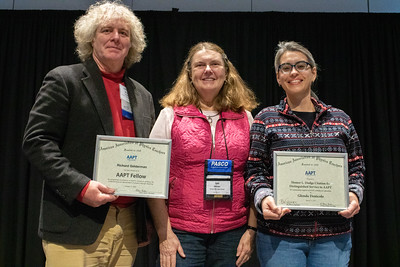
Richard Gelderman, emeritus professor, Physics and Astronomy Department, Western Kentucky University, Bowling Green, KY was recognized as an AAPT Fellow
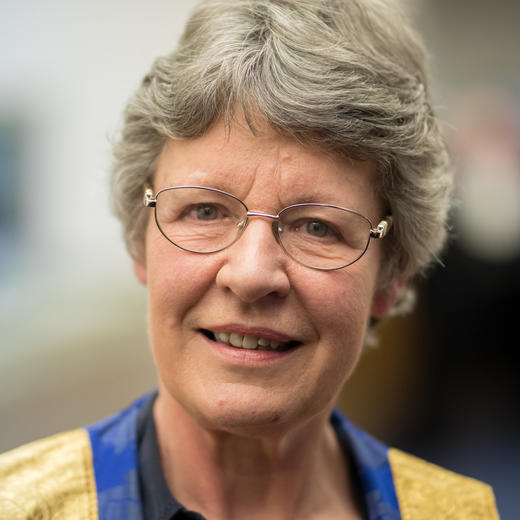 Jocelyn Bell Burnell was recognized as 2023 recipient of the Richtmyer Memorial Lecture Award. She was unable to attend and present her lecture but will be scheduled to do so at a future meeting. She is Dame of the British Empire, and a professor of Astrophysics at Oxford University. She graduated from the University of Glasgow with a Bachelor of Science degree in Natural Philosophy (physics) and obtained a PhD degree from the University of Cambridge. At Cambridge, she attended New Hall, Cambridge, and worked with Hewish and others to construct the Interplanetary Scintillation Array just outside Cambridge to study quasars, which had recently been discovered.
Jocelyn Bell Burnell was recognized as 2023 recipient of the Richtmyer Memorial Lecture Award. She was unable to attend and present her lecture but will be scheduled to do so at a future meeting. She is Dame of the British Empire, and a professor of Astrophysics at Oxford University. She graduated from the University of Glasgow with a Bachelor of Science degree in Natural Philosophy (physics) and obtained a PhD degree from the University of Cambridge. At Cambridge, she attended New Hall, Cambridge, and worked with Hewish and others to construct the Interplanetary Scintillation Array just outside Cambridge to study quasars, which had recently been discovered.
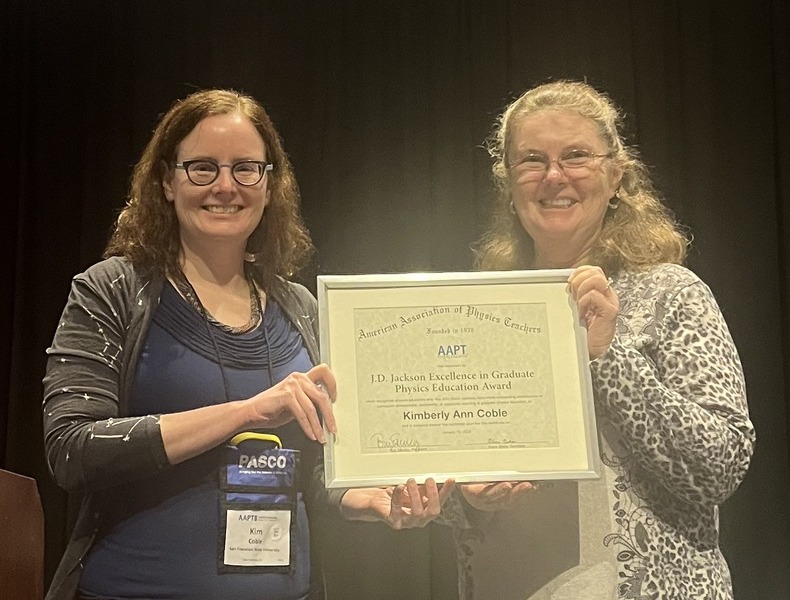 The 2023 John David Jackson Excellence in Graduate Physics Education Awardee was Kimberly Ann Coble. She was selected to receive the Jackson Award in recognition of her work as a teacher of graduate Physics and Astronomy. She is a pioneer in graduate physics & astronomy education. Coble earned her B.A. in Physics, Astronomy, and Astrophysics at The University of Pennsylvania. Both her M.S. and Ph.D. in Astronomy & Astrophysics were earned at The University of Chicago. She was a Postdoctoral Fellow at the University of California, Santa Barbara and a National Science Foundation Astronomy and Astrophysics Postdoctoral Fellow at The University of Chicago and Adler Planetarium. Her talk, Human Potentials in the Universe of Graduate Teaching and Mentoring was based on her work at San Francisco State University (SFSU) she created a new course called PHYS 885: Inclusive Pedagogy for the Physical Sciences. Nearly all master’s students who are Graduate Teaching Assistants (GTAs) in Physics & Astronomy at SFSU take this class to learn how to become more effective teachers for the ever more diverse students enrolling in the physical sciences. Throughout her career she has created opportunities for graduate students and beyond to become involved in research in meaningful ways and to engage in the academic work, such as presenting at conferences and writing manuscripts for publication, and supporting them in doing so well. When these students attend conferences, Coble goes out of her way to help students network, identify learning opportunities, and model academic engagement so that they get the most out of their experience.
The 2023 John David Jackson Excellence in Graduate Physics Education Awardee was Kimberly Ann Coble. She was selected to receive the Jackson Award in recognition of her work as a teacher of graduate Physics and Astronomy. She is a pioneer in graduate physics & astronomy education. Coble earned her B.A. in Physics, Astronomy, and Astrophysics at The University of Pennsylvania. Both her M.S. and Ph.D. in Astronomy & Astrophysics were earned at The University of Chicago. She was a Postdoctoral Fellow at the University of California, Santa Barbara and a National Science Foundation Astronomy and Astrophysics Postdoctoral Fellow at The University of Chicago and Adler Planetarium. Her talk, Human Potentials in the Universe of Graduate Teaching and Mentoring was based on her work at San Francisco State University (SFSU) she created a new course called PHYS 885: Inclusive Pedagogy for the Physical Sciences. Nearly all master’s students who are Graduate Teaching Assistants (GTAs) in Physics & Astronomy at SFSU take this class to learn how to become more effective teachers for the ever more diverse students enrolling in the physical sciences. Throughout her career she has created opportunities for graduate students and beyond to become involved in research in meaningful ways and to engage in the academic work, such as presenting at conferences and writing manuscripts for publication, and supporting them in doing so well. When these students attend conferences, Coble goes out of her way to help students network, identify learning opportunities, and model academic engagement so that they get the most out of their experience.
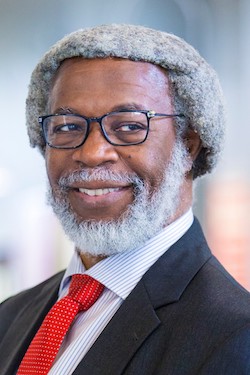 Dr. Sylvester James Gates, Jr. was the 2023 recipient of the prestigious Hans Christian Oersted Medal. The Oersted Medal recognizes his outstanding, widespread, and lasting impact on the teaching of physics through his national leadership in physics education, his exceptional service to AAPT, and his mentoring of students and in-service teachers. The year of 2022 marked the 51st consecutive year of his service as a university instructor in mathematics and physics. His talk, “A Half Century of a Mathematically Enabled Physicist’s Life,” focused on his lifetife of service and achievements. Gates is the Clark Leadership Chair in Science in the Department of Physics and School of Public Policy at the University of Maryland at College Park (UMCP). Prior to July of 2022 he spent the previous six years at Brown University, where he held appointments as the Brown Theoretical Physics Center Director, Ford Foundation Professor of Physics, an Affiliate Mathematics Professor, and a Faculty Fellow of the Watson Institute for International Studies & Public Affairs. In addition he was the 2021 president of the American Physical Society (APS). Gates has had a very long and successful career as a theoretical physicist and an educator. He is well known for his work on supersymmetry, supergravity, and superstring theory. From 1985-2016 he was a faculty member at University of Maryland, College Park as a University System Regents Professor, the John S. Toll Professor of Physics, the Director of the String and Particle Theory Center, and Affiliate Professor of Mathematics. He also served on the U.S. President’s Council of Advisors on Science and Technology (PCAST) under President Barack Obama. He served on the Maryland State Board of Education from 2009-2016, and the National Commission on Forensic Science from 2013-2016. Though he resigned in 2017 from the University of Maryland, he returned in 2022. In addition to the prestigious positions that Gates has held and awards that he received, he also has been instrumental in shaping physics education particularly at the undergraduate level through his service on various physics education focused advisory boards and task forces. Gates has provided undergraduate research experiences via the Summer Student Theoretical Physics Research Session (SSTPRS) since around 2000. He served as an active member of the Physics and Astronomy New Faculty Workshop (NFW) Advisory Board. The NFW has had a large impact on the teaching of physics in four-year colleges and universities. The NFW advisory board has helped the organizers improve the workshops and create a more impactful experience for participants. The Joint Task Force on Undergraduate Physics Programs (J-TUPP) was a joint task force convened by AAPT and APS. His work on promoting diversity, equity and inclusion in physics and the sciences is significant. As an example, he has given talks on racism and STEM, the history of African Americans in Science, and Inclusivity in String Theory. In his role in the Presidential line of the American Physical Society, he has pushed the organization forward on thinking about DEI efforts in Physics. He has taken bold stances on the issue and has helped APS develop concrete actions.
Dr. Sylvester James Gates, Jr. was the 2023 recipient of the prestigious Hans Christian Oersted Medal. The Oersted Medal recognizes his outstanding, widespread, and lasting impact on the teaching of physics through his national leadership in physics education, his exceptional service to AAPT, and his mentoring of students and in-service teachers. The year of 2022 marked the 51st consecutive year of his service as a university instructor in mathematics and physics. His talk, “A Half Century of a Mathematically Enabled Physicist’s Life,” focused on his lifetife of service and achievements. Gates is the Clark Leadership Chair in Science in the Department of Physics and School of Public Policy at the University of Maryland at College Park (UMCP). Prior to July of 2022 he spent the previous six years at Brown University, where he held appointments as the Brown Theoretical Physics Center Director, Ford Foundation Professor of Physics, an Affiliate Mathematics Professor, and a Faculty Fellow of the Watson Institute for International Studies & Public Affairs. In addition he was the 2021 president of the American Physical Society (APS). Gates has had a very long and successful career as a theoretical physicist and an educator. He is well known for his work on supersymmetry, supergravity, and superstring theory. From 1985-2016 he was a faculty member at University of Maryland, College Park as a University System Regents Professor, the John S. Toll Professor of Physics, the Director of the String and Particle Theory Center, and Affiliate Professor of Mathematics. He also served on the U.S. President’s Council of Advisors on Science and Technology (PCAST) under President Barack Obama. He served on the Maryland State Board of Education from 2009-2016, and the National Commission on Forensic Science from 2013-2016. Though he resigned in 2017 from the University of Maryland, he returned in 2022. In addition to the prestigious positions that Gates has held and awards that he received, he also has been instrumental in shaping physics education particularly at the undergraduate level through his service on various physics education focused advisory boards and task forces. Gates has provided undergraduate research experiences via the Summer Student Theoretical Physics Research Session (SSTPRS) since around 2000. He served as an active member of the Physics and Astronomy New Faculty Workshop (NFW) Advisory Board. The NFW has had a large impact on the teaching of physics in four-year colleges and universities. The NFW advisory board has helped the organizers improve the workshops and create a more impactful experience for participants. The Joint Task Force on Undergraduate Physics Programs (J-TUPP) was a joint task force convened by AAPT and APS. His work on promoting diversity, equity and inclusion in physics and the sciences is significant. As an example, he has given talks on racism and STEM, the history of African Americans in Science, and Inclusivity in String Theory. In his role in the Presidential line of the American Physical Society, he has pushed the organization forward on thinking about DEI efforts in Physics. He has taken bold stances on the issue and has helped APS develop concrete actions.
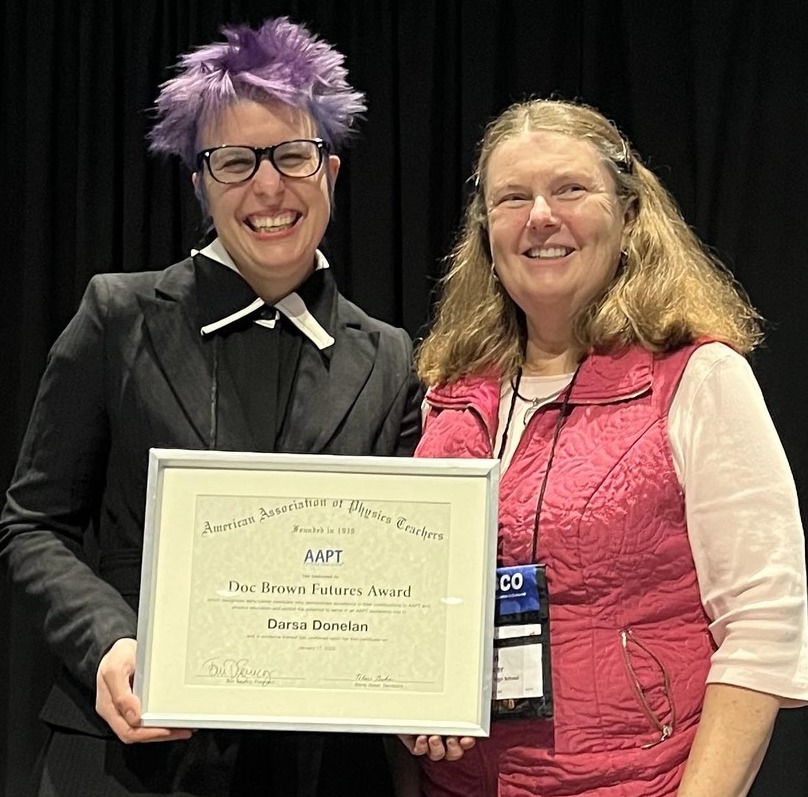 The 2023 recipient of the Doc Brown Futures Award was Darsa Donelan. The Doc Brown Futures Award recognizes early-career members who demonstrate excellence in their contributions to AAPT and physics education and exhibit the potential to serve in an AAPT leadership role. A member of AAPT since 2014, Donelan earned a B.S. in Physics and B.A. in Mathematics at Massachusetts College of Liberal Arts and a Ph.D in Physics at the University of Florida. Donelan is Continuing Assistant Professor at Gustavus Adolphus College in Saint Peter, Minnesota. In 2019 Donelan joined the AAPT/NASA collaboration to produce space science themed educational supplements supported by a grant from NASA. The team is an eclectic group with a range of skills and background, and Donelan fit right in. At the time, we had received instructions from the project leadership at Goddard Space Flight Center that we could expand the context area beyond heliosphysics to include subjects like planetary science. This led to the development of tutorials on Habitable Zones, Exoplanet Atmospheres, and Stellar Spectra.
The 2023 recipient of the Doc Brown Futures Award was Darsa Donelan. The Doc Brown Futures Award recognizes early-career members who demonstrate excellence in their contributions to AAPT and physics education and exhibit the potential to serve in an AAPT leadership role. A member of AAPT since 2014, Donelan earned a B.S. in Physics and B.A. in Mathematics at Massachusetts College of Liberal Arts and a Ph.D in Physics at the University of Florida. Donelan is Continuing Assistant Professor at Gustavus Adolphus College in Saint Peter, Minnesota. In 2019 Donelan joined the AAPT/NASA collaboration to produce space science themed educational supplements supported by a grant from NASA. The team is an eclectic group with a range of skills and background, and Donelan fit right in. At the time, we had received instructions from the project leadership at Goddard Space Flight Center that we could expand the context area beyond heliosphysics to include subjects like planetary science. This led to the development of tutorials on Habitable Zones, Exoplanet Atmospheres, and Stellar Spectra.
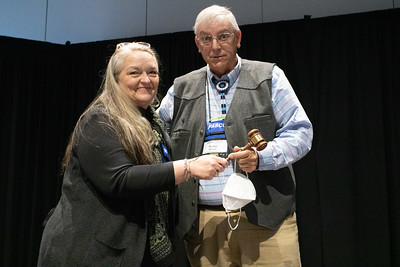 The meeting concluded with the Presidential Transfer where Toni Sauncy turned the Presidential Gavel over to incoming president, Duane Merrell.
The meeting concluded with the Presidential Transfer where Toni Sauncy turned the Presidential Gavel over to incoming president, Duane Merrell.

